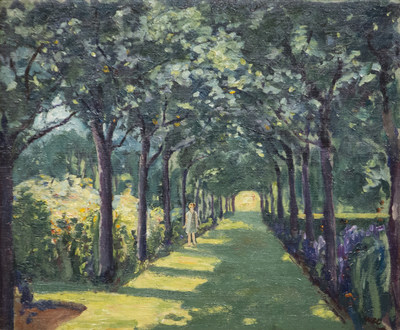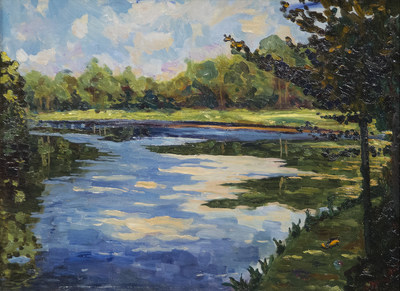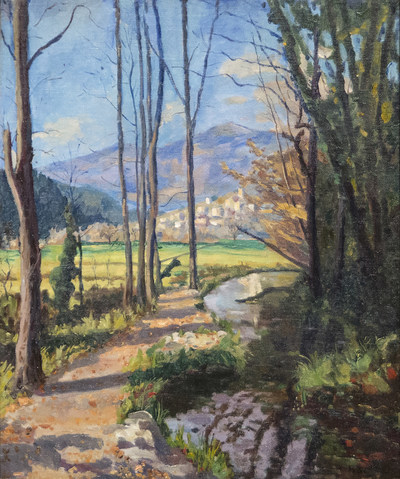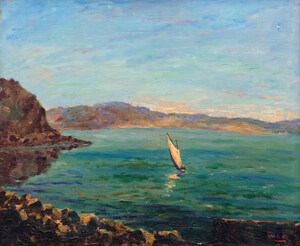PALM DESERT, Calif., March 20, 2018 /PRNewswire/ -- Widely known as the greatest statesman of the 20th century and the savior of Western civilization, a Nobel Prize winner, and the subject of a recent Academy Award-nominated film, more people than ever are taking an interest in Sir Winston Churchill (1874-1965). Yet few are aware that he was an avid painter. Eleven oil paintings by Churchill from the 1920s to 1940s, from the collection of the family of the late Julian Sandys, the eldest of Churchill's grandchildren, will join the spotlight in The Paintings of Sir Winston Churchill. On view at Heather James Fine Art, Palm Desert, CA, March 21 - May 30, 2018, the exhibition will travel to Heather James Fine Art, San Francisco, CA, June 1 - 30, 2018, and then to Heather James Fine Art, Jackson Hole, WY, July 1 - September 16, 2018.



The nine landscapes along with a coastal scene and a still life depict friends' estates, gardens, as well as family vacation spots, including some of Churchill's favorite travel destinations in France and Morocco.
These paintings formed part of a touring exhibition in Georgia commemorating the 50th anniversary of Churchill's death that was organized by the Millennium Gate Museum, Atlanta, GA (2014-15). Subsequently, the paintings have been shown at various exhibitions on Churchill organized in collaboration with the National Churchill Museum at Westminster College, Fulton, MO. Locations include the Mildred Lane Kemper Art Museum at Washington University, St. Louis, MO (2015-16); the RMS Queen Mary, Long Beach, CA (2016); and the Society of the Four Arts, Palm Beach, FL (2017-18). Prior to 2014, the paintings graced the walls of Sandys family homes in the United Kingdom.
"It's a unique honor to offer paintings by Sir Winston Churchill that come directly from immediate members of his family. They represent highly personal reflections by one of the world's greatest leaders," said James Carona, founder of Heather James Fine Art.
Winston Churchill was age 40 when he began to paint — at one of the lowest moments of his life. It was June 1915, shortly after his forced resignation as First Lord of the Admiralty following the disastrous Dardanelles campaign. One Sunday afternoon, his sister-in-law Lady Gwendoline handed him a paintbrush belonging to his young nephew. In his 1921 essay "Painting as a Pastime" Churchill recalled, "And then it was that the Muse of Painting came to my rescue." Painting provided a refuge from the stresses of politics and journalism, and from what Churchill called "the black dog" of depression. Moreover, Churchill saw painting as a testing ground for leadership strengths such as audacity, humility, foresight, and strength of memory.
According to Duncan Sandys, a great-grandson of Winston Churchill and son of Julian Sandys, "Although painting was just a hobby, Churchill learned new skills which he used in his political and diplomatic life. It gave him a sanctuary during adversity and, I believe, made him more effective in 1940 as Hitler prepared to invade Britain."
Providing a window into the private side of Churchill, one of the earliest paintings on view, An Avenue at Frinton-On-Sea, Essex, with Miss Diana Churchill, c. 1922, depicts Churchill's then-13-year-old eldest child on holiday, walking along a light-dappled path below an awning of trees. Given that his daughter Marigold had died suddenly in 1921, he had lost his seat in Parliament, and his wife Clementine was expecting their fifth child Mary later in 1922, this poignant image perhaps echoes Churchill's own journey at the time from darkness into light.
He was inspired by the Impressionists and enjoyed painting en plein air. And wherever he went — on vacation or for work — Churchill was accompanied by his paints, brushes, canvases, and an easel. His medium of choice was oil, and his preferred subjects were landscapes and seascapes. His approximately 550 canvases — or his "daubs" as he called them — tell the story of his travels across Europe, North America, and North Africa. He painted the most in the South of France. Coast Scene Near Marseilles, c. 1935, and The Sunken Garden of La Dragonnière, Cap Martin, c. 1930s (given by Clementine as a wedding present to her grandson Julian Sandys) on view recall the palette and the broad brushstrokes of the Impressionists he admired.
Churchill was largely self-taught as a painter although his style was developed through mentoring from friends and accomplished painters such as Sir Oswald Birley, Sir John and Lady (Hazel) Lavery, Paul Maze, Sir William Nicholson, and Walter Sickert. He visited museums and galleries to study great works, and copied paintings by Charles Daubigny, John Singer Sargent, and Paul Cézanne.
Throughout his life Churchill was always modest about the quality of his work. In 1921 he sent five paintings under an assumed name (Charles Morin) to an exhibition at the Galerie Druet in Paris. In 1947 he again employed a pseudonym (David Winter) when submitting two works to London's Royal Academy of Arts for its summer exhibition — his true name revealed only after the two were accepted. He received further recognition as an artist when the Royal Academy elected him an Honorary Academician Extraordinary in 1948, and held a solo exhibition of his works that toured internationally in 1958-59 — the institution's first and only exhibition of an amateur artist. Among the paintings on view, Lake Near Breccles in Autumn, c. 1930, On the Var, c. 1935 (which hung in the Churchill's post-war London home, and later in Clementine's London flat until her death in 1977), and The Mill at St.-Georges-Motel, c. 1930, were exhibited respectively at the Royal Academy's summer exhibitions in 1949, 1952, and 1962.
Hesitant about their quality, Churchill rarely gave away his prized works other than as gifts to family, friends, colleagues, and foreign dignitaries he admired. These included Her Majesty Queen Elizabeth II, Presidents Roosevelt, Truman, and Eisenhower, former British Prime Minister David Lloyd-George, and General George C. Marshall. In addition, Churchill personally selected one painting to give to each of his ten grandchildren. Marrakech, 1947, on view, was the one given to Julian Sandys.
Churchill fervently pursued what he called his "joyride in a paint-box" for nearly half a century. This passion never left him and he wrote that, "When I get to heaven I mean to spend a considerable portion of my first million years in painting, and so get to the bottom of the subject."
ABOUT HEATHER JAMES FINE ART
Heather James Fine Art presents a rare look into art history's past and present, offering important works from a cross-section of periods, movements, and genres — including Impressionist and Modern, Post-War and Contemporary, American and Latin American, Old Masters, and antiquities.
In 21 years, Heather James Fine Art has expanded into a global network with galleries located in San Francisco, California (opening March 2018); Santa Barbara, California (opening fall 2018); Palm Desert, California; Jackson Hole, Wyoming; and New York, New York, and consultancies in Los Angeles, Chicago, and Austin.
Each year, its galleries present an array of museum quality exhibitions exploring historical and contemporary themes, or examining the work of individual influential artists.
Heather James Fine Art is dedicated to bringing exceptional art to private clients and museums across the world, with the utmost personalized logistical, curatorial, and financial services.
Heather James Fine Art galleries:
California
45188 Portola Avenue
Palm Desert
49 Geary Street
San Francisco – opening late March 2018
1298 Coast Village Road
Santa Barbara – opening fall 2018
Wyoming
172 Center Street, Suite 101
Jackson Hole
New York
42 East 75th Street
New York
Follow Heather James Fine Art on Instagram, Facebook and Twitter
Press Contact:
The Busby Group
Scott Busby
[email protected]
Parinaz Farzin
[email protected]
310.439.9400
SOURCE Heather James Fine Art
Related Links
WANT YOUR COMPANY'S NEWS FEATURED ON PRNEWSWIRE.COM?
Newsrooms &
Influencers
Digital Media
Outlets
Journalists
Opted In




Share this article